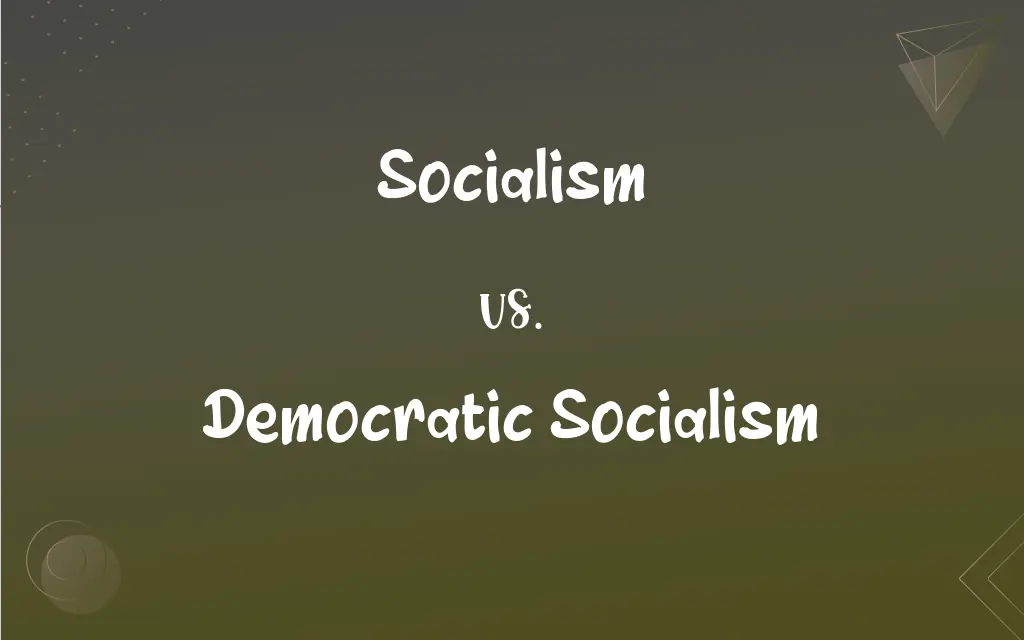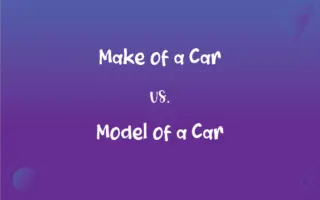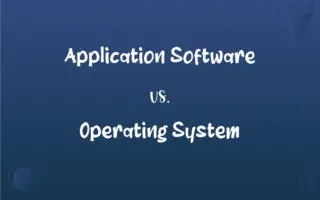Socialism vs. Democratic Socialism: What's the Difference?
Edited by Janet White || By Harlon Moss || Updated on October 9, 2023
Socialism seeks collective/government ownership of production means, while democratic socialism merges this with democratic governance, valuing both social ownership and democracy.

Key Differences
Socialism embodies an economic and social system wherein the means of production, distribution, and exchange are owned by the community as a whole. This ideology posits that wealth and power should be shared among citizens to ensure equity. Democratic socialism, while sharing foundational beliefs in social ownership, underscores the cruciality of achieving and maintaining this through democratic means. Thus, socialism addresses economic disparities through collective ownership, and democratic socialism does so while zealously safeguarding democratic processes.
Navigating through socialism, one often encounters the objective of diminishing the societal disparities engendered by unchecked capitalism. Within this framework, societal resources and production means are collectively owned, and wealth is redistributed to promote parity. Democratic socialism similarly seeks to curtail economic inequalities but does so under the guiding principle that all societal decisions, including the implementation and maintenance of socialism, should be determined democratically.
Socialism can manifest in various forms, with some models offering a more prescriptive role for government in managing and directing economic activities and resources. The ideology intrinsically pursues equal distribution of wealth and power to obviate societally systemic inequalities. In the realm of democratic socialism, adherence to democratic principles is paramount, ensuring that citizens retain collective decision-making powers, particularly concerning policy creation and implementation concerning economic redistribution and management.
Within socialism, there can be less emphasis on how societal decisions are made, as long as the outcome is equitable distribution and collective ownership. The means by which socialism is implemented can vary widely, depending on the sociopolitical context. On the contrary, democratic socialism is inflexible regarding its democratic commitment, viewing the democratic process not just as a means but an end in itself, thereby ensuring that socialism is not only achieved but also maintained through democratic principles and structures.
Comparison Chart
Governance
May not emphasize democratic processes
Firmly rooted in democratic processes
ADVERTISEMENT
Economic Philosophy
Collective ownership of production means
Collective ownership, achieved/maintained democratically
Political System
Varies (can be non-democratic)
Always democratic
Decision Making
Can be centralized
Decentralized and democratic
Implementation of Social Policies
Can be top-down
Bottom-up, through democratic consensus
Socialism and Democratic Socialism Definitions
Socialism
Socialism advocates for collective ownership of production means.
In socialism, major industries might be owned by the state to distribute wealth equitably.
ADVERTISEMENT
Democratic Socialism
Democratic socialism seeks equitable distribution of resources, safeguarded by democratic principles.
Under democratic socialism, wealth redistribution policies are established and modified through democratic consensus.
Socialism
It aims to reduce or eliminate the inequality seen in capitalist systems.
Socialism often involves creating policies that redistribute wealth to address societal disparities.
Democratic Socialism
Democratic socialism blends socialist principles with democratic governance.
Democratic socialism seeks to balance individual liberties with economic equality through democratic means.
Socialism
Socialism strives for a cooperative management of economic systems.
Socialism encourages cooperative enterprises where decisions are made collectively.
Democratic Socialism
Democratic socialism respects both social ownership and democracy.
In democratic socialism, governments might own industries, but citizens determine policies and leaders via voting.
Socialism
Socialism can entail governmental control over vital industries.
Under socialism, healthcare services are typically provided by the government to ensure universal access.
Democratic Socialism
It advocates for social justice within a democratic framework.
Democratic socialism involves implementing social safety nets, decided upon through democratic processes.
Socialism
It pursues uniformity in wealth and opportunities.
Socialism might utilize progressive tax systems to redistribute wealth and foster economic uniformity.
Democratic Socialism
It emphasizes citizen participation in decision-making.
Democratic socialism involves citizens voting on major economic and social policies.
Socialism
Any of various theories or systems of social organization in which the means of producing and distributing goods is owned collectively or by a centralized government that often plans and controls the economy.
FAQs
What makes democratic socialism distinct from other socialism forms?
Democratic socialism uniquely intertwines socialist economic structures with unwavering commitment to democratic governance.
Can socialism exist without government control?
Yes, socialism can manifest as cooperative or collective ownership without necessitating strict government control.
Does socialism always involve a strong centralized government?
While socialism often involves centralized planning, it can manifest in various forms, including decentralized, community-led initiatives.
Can countries exhibit elements of both capitalism and socialism?
Yes, mixed economies can blend capitalist and socialist elements, sometimes employing strategies from both systems.
What’s the role of private property in democratic socialism?
Democratic socialism might allow private property but seeks to restrict or regulate excessive wealth accumulation and ensure public welfare.
How does democratic socialism ensure citizen participation?
Democratic socialism typically enforces democratic principles, like voting and free speech, to empower citizen participation.
Is socialism against individual wealth accumulation?
Not necessarily, but socialism generally seeks to mitigate extreme wealth disparities through mechanisms like wealth redistribution.
How does democratic socialism protect individual freedoms?
By adhering to democratic principles, democratic socialism safeguards individual freedoms through mechanisms like voting and legal protections.
Can democratic socialism coexist with capitalist structures?
Yes, democratic socialism can incorporate capitalist structures but seeks to regulate and supplement them to ensure equitable wealth distribution.
In democratic socialism, how are leaders chosen?
Leaders in democratic socialism are typically elected by the populace, adhering to democratic principles.
In democratic socialism, who controls the means of production?
While there’s collective ownership, the specific management can vary, with democratic processes determining the oversight and control of production.
Is socialism inherently against free market systems?
While socialism emphasizes collective ownership, it can coexist in varied forms with market systems, depending on the specific model and implementation.
How does socialism approach healthcare?
Generally, socialism advocates for universally accessible healthcare, often provided or regulated significantly by the state.
Can a country transition from capitalism to socialism or vice versa?
Yes, countries can transition between economic systems, often involving significant shifts in policies, regulations, and social structures.
How are business profits handled in democratic socialism?
In democratic socialism, profits may be subjected to regulations and taxes designed to redistribute wealth and fund public services.
How does socialism handle wealth distribution?
Socialism strives for equitable wealth distribution, often through government redistribution mechanisms.
How does socialism address unemployment?
Socialism might address unemployment through various means, such as providing state jobs, unemployment benefits, or supporting worker cooperatives.
How do democratic socialists view wealth accumulation?
Democratic socialists might accept wealth accumulation but seek systems that prevent excessive disparities and ensure widespread wealth access.
Does socialism stifle economic competition?
Socialism seeks equitable distribution and may regulate or limit extreme competitive practices that could endanger this, depending on its implementation.
Can socialism lead to economic inefficiency?
Critics argue that socialism can hinder innovation and efficiency due to reduced competition, while proponents argue that it ensures stable, equitable access to resources.
About Author
Written by
Harlon MossHarlon is a seasoned quality moderator and accomplished content writer for Difference Wiki. An alumnus of the prestigious University of California, he earned his degree in Computer Science. Leveraging his academic background, Harlon brings a meticulous and informed perspective to his work, ensuring content accuracy and excellence.
Edited by
Janet WhiteJanet White has been an esteemed writer and blogger for Difference Wiki. Holding a Master's degree in Science and Medical Journalism from the prestigious Boston University, she has consistently demonstrated her expertise and passion for her field. When she's not immersed in her work, Janet relishes her time exercising, delving into a good book, and cherishing moments with friends and family.































































